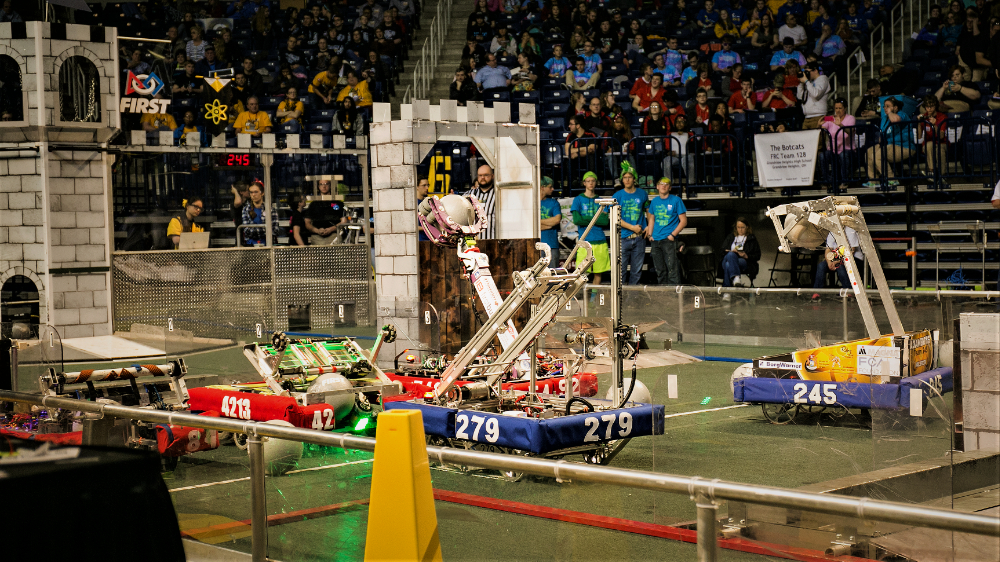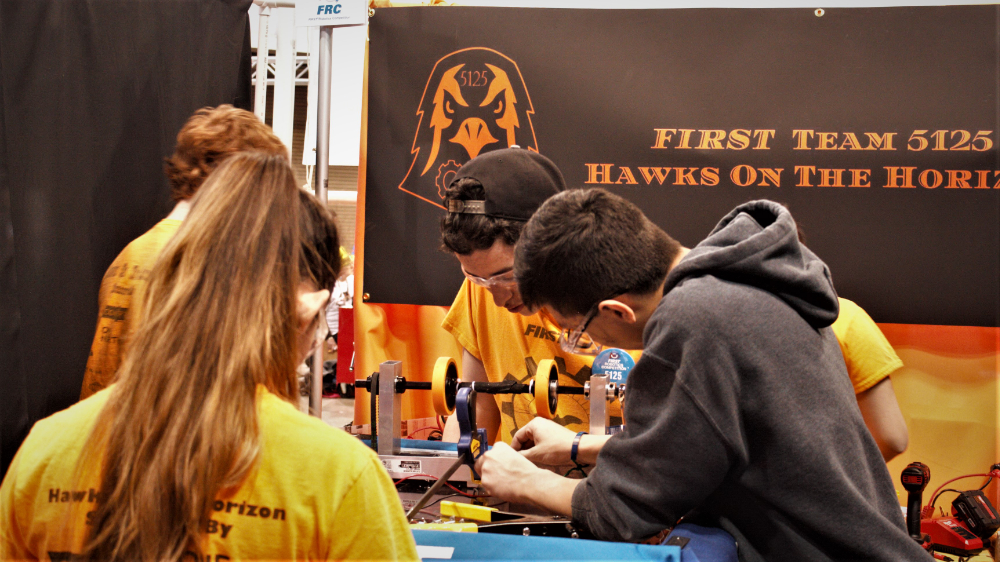
Robohub.org
From member to mentor: Life after being a FIRST student

3! 2! 1! Go! Suddenly, robots jerk into motion and zoom across the field to score points, crossing over several types of terrain and shooting balls into high and low goals. Another buzzer sounds, drivers pick up their controls and all six robots—three per alliance—are now under human control. As these huge 120-pound robots score points, cheers ring through a packed stadium, fueled by high school students who worked hard to build their robot in just six weeks. As the match ends, nervous and excited students wait to see who is the winner of the 2016 world championship.
This was my last match as a member of the Girls of Steel FIRST Robotics Competition Team #3504. FIRST (For Recognition and Inspiration of Science and Technology) is a robotics program for students from K-12, and I was in the last division, FRC. The program is about more than introducing students to STEM and giving them hands-on experience, it’s about helping students to grow and have positive impacts by recognizing community service efforts, celebrating good values, developing soft skills, and guiding students to pursue higher education.
https://www.youtube.com/watch?v=mtE6Va6oOhU
The next fall, I was off to college at the Illinois Institute of Technology in Chicago, studying to become a mechanical engineer. For the first time in my life, I was on my own. My time was so swept away by schoolwork, clubs, exploring the city, and making new friends that FIRST became a distant memory. Now, I fear that if I hadn’t bumped back into it, I would have lost touch with the program that played such a critical role in my life. While at a robotics club meeting, sign ups for the FRC Midwest Regional Planning Committee were passed around. Wanting to somehow get involved, I signed up.
I had no idea what to expect as I walked into a big conference room with a friend, and fellow FRC alum, for our first committee meeting. As the meeting progressed—densely filled with information and detailed plans for upcoming seasons and younger leagues—I sat there stunned. Regardless of if they were an alum or not, there were so many people who dedicated their time and effort to make this program work for students. It was a wake-up call. During my four years of being a member, I took so much for granted and didn’t realize the magnitude of hard work that volunteers and mentors put in for the students. They were the ones who supported and helped make me the person that I am today. So, to all of the volunteers and mentors who may be reading this, thank you for everything, I couldn’t have done it without you.
Just like that, I was hooked on FIRST once again. I kept going to meetings, trying to help as much as I could while making connections with other volunteers. Right before the season started, there were a couple teams who had a shortage of mentors, which is how I found Hawks on the Horizon FRC team #5125. The first meeting I went to with the students opened my eyes; I was so used to being a member, I had no idea how to mentor FRC. Eventually, I learned how to be a different figure in a familiar situation and how to adjust to the differences between a large all-girls team, with many resources, and a small family-like team. Yet, without a doubt, I knew this was my new team. From the very first day, I was welcomed with open arms by the mentors and students, who made sure I came back.

“Who is your role model?” was a common question for me when I was very young, and I’d respond with a superhero. Now it’s never asked, but I have a better answer since I’ve gotten the chance to meet some of them. One of my role models is a student mentor from my old team. Although I haven’t seen her in a long time, I found myself remembering conversations we’d had years ago about some of the challenges of being a student mentor. Knowing I wasn’t alone, and how she’d dealt with some sticky situations, helped me guide students to find their own answers and become comfortable being hands-off myself. I’ve learned so much from past mentors like her, fellow mentors, and the students themselves. I’m happy to have found my FIRST family again.
The Midwest Regional was a whole new experience for me. During high school, my competition days were hectic, filled with fixing the robot, talking to other teams, and cheering for our alliance. At this past regional, it was an entirely different world. I was the student volunteer coordinator, helping run the student ambassador program and talking to people about how to get involved. I only visited my team when I got the chance. I was less aware of specific robots and paid more attention to what happens behind the scenes to ensure regional runs like a well-oiled machine. I want to be more involved in the process, since these competitions ignited a passion for engineering within me, and I cannot express with words how grateful I am.
Regardless of the changes within the past year, by the end of the competition, I still rocked the uniform. I’m incredibly proud of Hawks on the Horizon, thankful for Girls of Steel, and amazed by everyone in the Midwest Planning Committee. This transition from being a member to mentor has been an amazing journey and it doesn’t stop here. I’ll be working to give back for the rest of my life by helping make programs like FIRST happen for future students. Thank you to everyone who is a part of this organization and to find a team or event, go to firstinspires.org.
If you enjoyed this article, you may also want to read:
- FIRST 2013 photo essay: Girls of Steel in the trenches at the FRC championship finals
- FIRST 2014 photo essay: Girls of Steel back in St. Louis
- ‘It’s a reminder we are making a difference in the world’: Girls of Steel follow-up
- Getting into the driver’s seat: Girls of Steel tell us how they got hooked on robotics
- The story of Atlas, FRC Team #3504 Girls of Steel
- A vision for Nigeria’s youth: FIRST LEGO league competition held in Nigeria
tags: c-Education-DIY, Competition-Challenge, cx-Events, cx-Research-Innovation, FIRST




